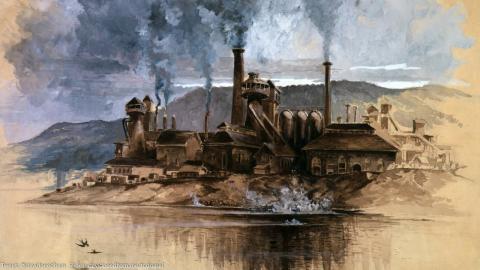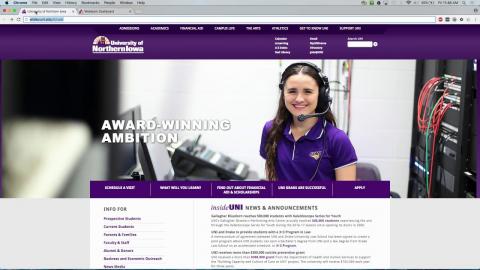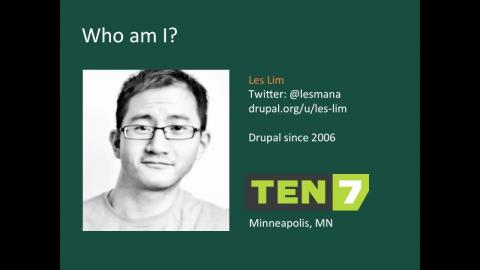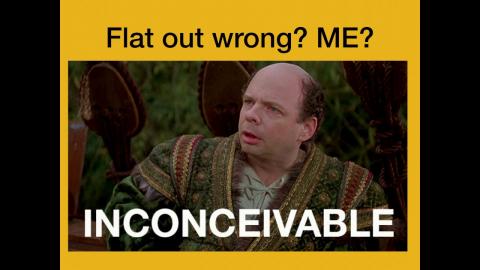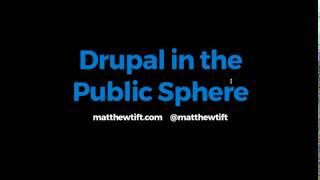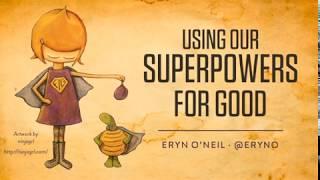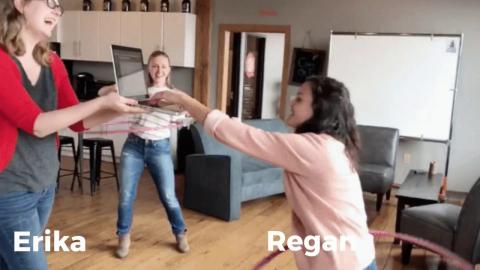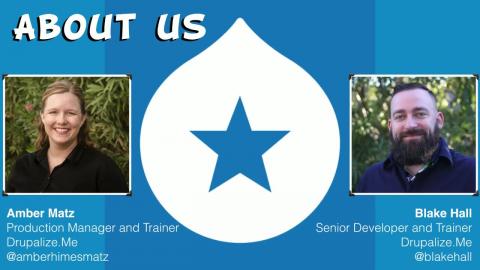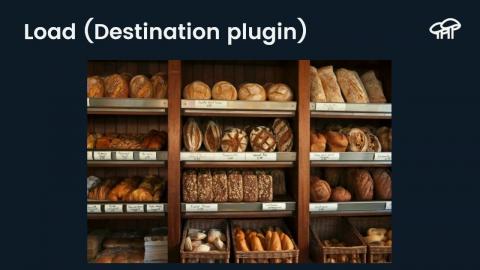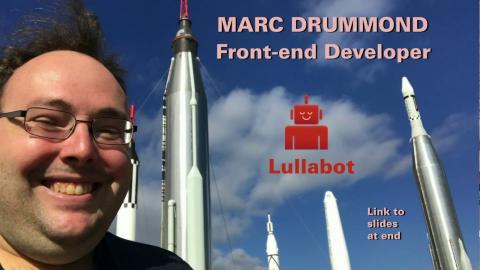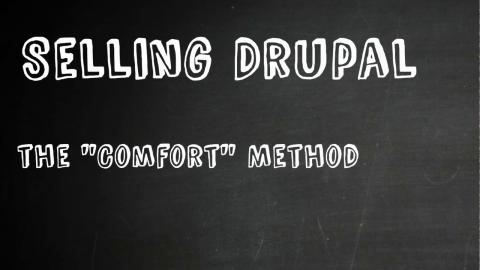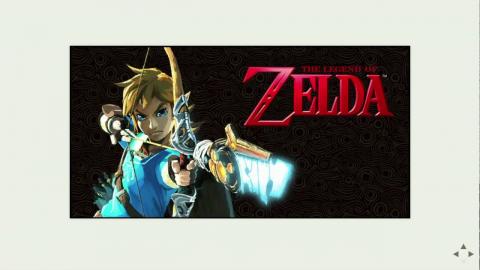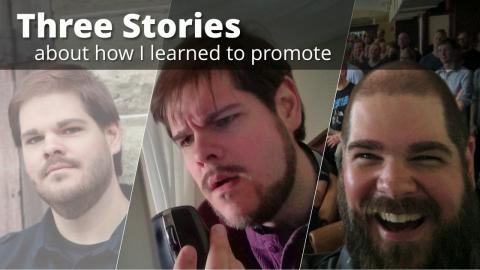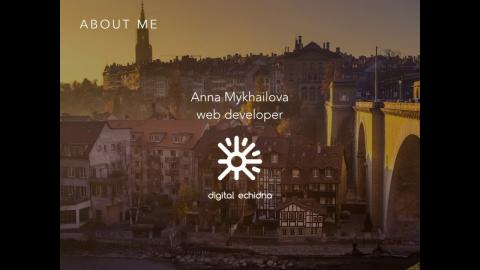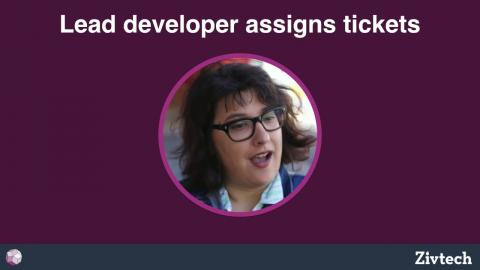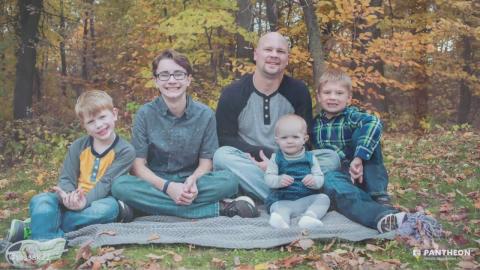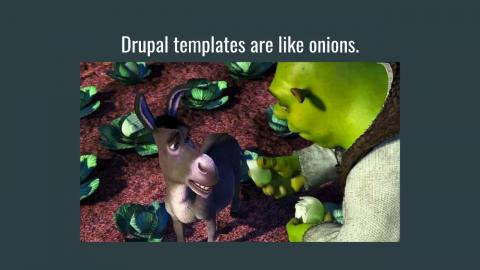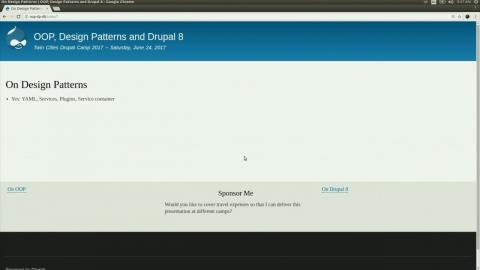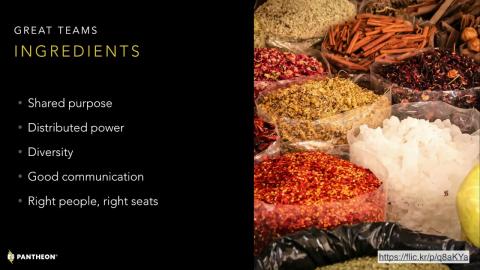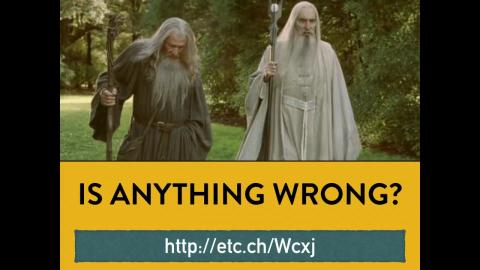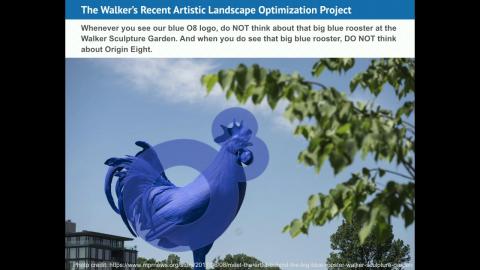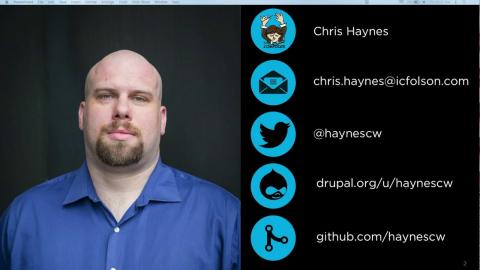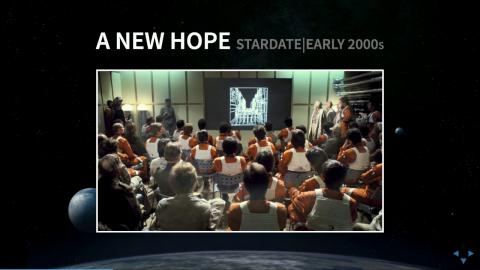Introduction
Videos from DrupalCamp Twin Cities 2017.
Conference page
Video Sponsor(s) / Provided by
Curated Videos
Description
David Needham
Do you ever get to the end of your workday and wonder where the day went? Even worse - do you have days where you feel like you didn’t get anything done?
Ivy Lee’s proven technique will help you achieve peak productivity while boosting your confidence and overall happiness at work. This session takes a 100-year-old productivity hack and uses modern tools and gamification to make it even more accessible for the average person.
Add in a few key continuous improvement techniques and you have a truly life-changing strategy for self-help, increasing productivity at work, and improving your happiness!
Learning Objectives & Outcomes:
In this session I’ll:
— Discuss why the Ivy Lee Method works and share my experience.
— Demonstrate the technique in a Google Form that you can copy.
— Walk through the most helpful questions to ask yourself each day.
— Give suggestions for realistic goal setting and scoring.
— Share techniques for staying on task throughout the day.
http://2017.tcdrupal.org/session/peak-productivity-ivy-lee
Do you ever get to the end of your workday and wonder where the day went? Even worse - do you have days where you feel like you didn’t get anything done?
Ivy Lee’s proven technique will help you achieve peak productivity while boosting your confidence and overall happiness at work. This session takes a 100-year-old productivity hack and uses modern tools and gamification to make it even more accessible for the average person.
Add in a few key continuous improvement techniques and you have a truly life-changing strategy for self-help, increasing productivity at work, and improving your happiness!
Learning Objectives & Outcomes:
In this session I’ll:
— Discuss why the Ivy Lee Method works and share my experience.
— Demonstrate the technique in a Google Form that you can copy.
— Walk through the most helpful questions to ask yourself each day.
— Give suggestions for realistic goal setting and scoring.
— Share techniques for staying on task throughout the day.
http://2017.tcdrupal.org/session/peak-productivity-ivy-lee
Conference
Description
DeWayne Purdy
At the University of Northern Iowa, we monitor our websites with a dashboard of our own creation. It tracks our 200+ sites in dev, stage and production, providing us with the Drupal version each site is on, as well as information on Git, the database, Google Analytics, and module update status. One area of the dashboard is tasked to noting any security updates due on the site.
Learning Objectives & Outcomes:
Ways to develop a dashboard and the information it can provide.
http://2017.tcdrupal.org/session/monitoring-our-sites-building-our-own-dashboard
At the University of Northern Iowa, we monitor our websites with a dashboard of our own creation. It tracks our 200+ sites in dev, stage and production, providing us with the Drupal version each site is on, as well as information on Git, the database, Google Analytics, and module update status. One area of the dashboard is tasked to noting any security updates due on the site.
Learning Objectives & Outcomes:
Ways to develop a dashboard and the information it can provide.
http://2017.tcdrupal.org/session/monitoring-our-sites-building-our-own-dashboard
Conference
Description
Les Lim
Note for people in today's session: If you're interested in viewing the rest of the prepared session where we create a new View from scratch, you can view the recorded session video from Midcamp 2016 starting here: https://www.youtube.com/watch?v=yneXWXY_Y_w&feature=youtu.be&t=40m
This session is intended to introduce the concept of Views, a powerful tool for automatically collecting and displaying lists of content according to rules you define. We will define key terms and locate them in the interface, look at examples of Views that are pre-installed in a Standard profile Drupal installation, and fiddle with them to observe how different configuration options change their behavior. We will also create an example View from scratch.
Our example will be derived from the "farmers market" guiding scenario being used by the Drupal 8 User Guide project (https://www.drupal.org/project/user_guide).
http://2017.tcdrupal.org/session/introduction-views
Note for people in today's session: If you're interested in viewing the rest of the prepared session where we create a new View from scratch, you can view the recorded session video from Midcamp 2016 starting here: https://www.youtube.com/watch?v=yneXWXY_Y_w&feature=youtu.be&t=40m
This session is intended to introduce the concept of Views, a powerful tool for automatically collecting and displaying lists of content according to rules you define. We will define key terms and locate them in the interface, look at examples of Views that are pre-installed in a Standard profile Drupal installation, and fiddle with them to observe how different configuration options change their behavior. We will also create an example View from scratch.
Our example will be derived from the "farmers market" guiding scenario being used by the Drupal 8 User Guide project (https://www.drupal.org/project/user_guide).
http://2017.tcdrupal.org/session/introduction-views
Conference
Description
Keri Poeppe
During project our colleagues and clients look to PMs for leadership and direction. But when it comes to down to it, PMs rarely have direct power over anyone involved in a project. Instead we rely on our soft skills and winning personalities to coax, entice, and charm people into doing our bidding. And some days, that just doesn't cut it. While reading about content marketing and methods for influencing consumers, I began to wonder if I could apply those techniques to my own work. What can PMs learn from marketers? How might we use the dark arts of digital marketing to drive and motivate our colleagues, guide our projects, and achieve our ultimate goals?
http://2017.tcdrupal.org/session/when-being-nice-fails-dark-arts-project-management
During project our colleagues and clients look to PMs for leadership and direction. But when it comes to down to it, PMs rarely have direct power over anyone involved in a project. Instead we rely on our soft skills and winning personalities to coax, entice, and charm people into doing our bidding. And some days, that just doesn't cut it. While reading about content marketing and methods for influencing consumers, I began to wonder if I could apply those techniques to my own work. What can PMs learn from marketers? How might we use the dark arts of digital marketing to drive and motivate our colleagues, guide our projects, and achieve our ultimate goals?
http://2017.tcdrupal.org/session/when-being-nice-fails-dark-arts-project-management
Conference
Description
Lynn Winter
Even after 16 years of managing projects, I still learn from clients. Each client is a unique snowflake, amazing and challenging all in one little package…or maybe not. It turns out that they aren’t as different as you think. There are common traits and needs between them all.
I have found there is eight tried and tested rules to follow when working with clients not matter what role you have on the team. When I stray from them is when issues arise. Maybe I want to avoid a tough conversation or even convince myself that ‘this time it’s going to be different.’ It’s never different and I have learned my lesson again.
The goal of this session it to help remind us all (and share with those who are new) what these lessons are and why they are so important. We will walk through the red flags that should be warning us of these situations. We will talk about why they are risky and most importantly how we can make sure to avoid the blunders.
You will walk away with heightened reflexes that will allow you to avoid these problems in your future Drupal projects. After all, wouldn’t all of us try anything to make it easier to work with our clients?
http://2017.tcdrupal.org/session/8-lessons-clients-teach-us-everyday
Even after 16 years of managing projects, I still learn from clients. Each client is a unique snowflake, amazing and challenging all in one little package…or maybe not. It turns out that they aren’t as different as you think. There are common traits and needs between them all.
I have found there is eight tried and tested rules to follow when working with clients not matter what role you have on the team. When I stray from them is when issues arise. Maybe I want to avoid a tough conversation or even convince myself that ‘this time it’s going to be different.’ It’s never different and I have learned my lesson again.
The goal of this session it to help remind us all (and share with those who are new) what these lessons are and why they are so important. We will walk through the red flags that should be warning us of these situations. We will talk about why they are risky and most importantly how we can make sure to avoid the blunders.
You will walk away with heightened reflexes that will allow you to avoid these problems in your future Drupal projects. After all, wouldn’t all of us try anything to make it easier to work with our clients?
http://2017.tcdrupal.org/session/8-lessons-clients-teach-us-everyday
Conference
Description
Matthew Tift
Last September, Dries Buytaert and I published the results of our research that examined Drupal commit data, in order to help understand who develops Drupal, how much of that work is sponsored, and the sources of sponsorship. While this was the result of many months of work and hours of conversations, we acknowledged that we could not sufficiently recognize non-code contributions, the complexity of contributions, or quality of work. Commit credits can only tell us so much.
This session will propose a theoretical framework that accounts for the complexities of our contributions that cannot be easily measured. Drawing from a wide range of public sphere theory -- including the work of scholars such as Jürgen Habermas, John Dewey, and Nancy Fraser -- this session will describe Drupal as something more than just individuals, organized groups, institutions, or markets. We'll consider how proposals in the Drupal community are deliberated, how change is enacted, and who influences these processes, taking into account various sites of collaboration, such as IRC, issue queues, local user groups, DrupalCamps, and DrupalCons. Attendees will leave this session with a deeper understanding of the Drupal community, how it relates to the broader public, and how our community contributes to the public good.
http://2017.tcdrupal.org/session/drupal-public-sphere
Last September, Dries Buytaert and I published the results of our research that examined Drupal commit data, in order to help understand who develops Drupal, how much of that work is sponsored, and the sources of sponsorship. While this was the result of many months of work and hours of conversations, we acknowledged that we could not sufficiently recognize non-code contributions, the complexity of contributions, or quality of work. Commit credits can only tell us so much.
This session will propose a theoretical framework that accounts for the complexities of our contributions that cannot be easily measured. Drawing from a wide range of public sphere theory -- including the work of scholars such as Jürgen Habermas, John Dewey, and Nancy Fraser -- this session will describe Drupal as something more than just individuals, organized groups, institutions, or markets. We'll consider how proposals in the Drupal community are deliberated, how change is enacted, and who influences these processes, taking into account various sites of collaboration, such as IRC, issue queues, local user groups, DrupalCamps, and DrupalCons. Attendees will leave this session with a deeper understanding of the Drupal community, how it relates to the broader public, and how our community contributes to the public good.
http://2017.tcdrupal.org/session/drupal-public-sphere
Conference
Description
Eryn O'Neil
We usually think of technology as a tool, something as indifferent as a hammer or a ruler. But in a world where algorithms decide which version of the news you read, pretending our software is detached is naive—or even dangerous. Technology has become an intermediary in nearly every part of our lives, from electronic medical records to online bill-pay systems to apps that remember which craft beers you’ve tasted.
So, when so few technologists (that’s us) are creating software for use by so many (that’s nearly everyone else in the world), how can we do right by them? What responsibility do we have to use our skills for good? And how can we get this right when humans beings insist on being so varied and complicated and, well… human?
About the speaker
Eryn O’Neil is an independent PHP developer and tech lead. Coming from the agency world, she has worked on everything from e-commerce and online promotions, to sites for rad Minnesota organizations (shoutout to NiceRide and Doomtree!), to developing a proprietary framework and CMS. Her philosophy is to build software by placing humans first: both the people who will use it and the developers who build it with you (and maintain it afterward).
Based in Minneapolis, Eryn spends most of her free time blues dancing, flying on a trapeze, and wishing it weren’t snowing.
We usually think of technology as a tool, something as indifferent as a hammer or a ruler. But in a world where algorithms decide which version of the news you read, pretending our software is detached is naive—or even dangerous. Technology has become an intermediary in nearly every part of our lives, from electronic medical records to online bill-pay systems to apps that remember which craft beers you’ve tasted.
So, when so few technologists (that’s us) are creating software for use by so many (that’s nearly everyone else in the world), how can we do right by them? What responsibility do we have to use our skills for good? And how can we get this right when humans beings insist on being so varied and complicated and, well… human?
About the speaker
Eryn O’Neil is an independent PHP developer and tech lead. Coming from the agency world, she has worked on everything from e-commerce and online promotions, to sites for rad Minnesota organizations (shoutout to NiceRide and Doomtree!), to developing a proprietary framework and CMS. Her philosophy is to build software by placing humans first: both the people who will use it and the developers who build it with you (and maintain it afterward).
Based in Minneapolis, Eryn spends most of her free time blues dancing, flying on a trapeze, and wishing it weren’t snowing.
Conference
Description
Erika Stenrick and Regan Keller
We all know how important users are. Still, when budgets and timelines get tight, engaging with your actual site visitors is often the first thing to go.
No matter what the client size, we have found that it doesn't have to be that way! Not only can user perspectives be included efficiently, their prominent inclusion helps the entire team function more smoothly. Decisions become easier. Collaboration goes more smoothly. Content strategy becomes clearer. And you make better websites!
The goal of this session is to offer on-the-ground tactics for
— understanding user experiences and mental models
— applying what you've learned about user behavior to UX, design & content strategy
— lightweight approaches to usability testing
— how to make sure your own (and your clients') assumptions don't get in the way
— prioritizing development work with users in mind
If you've ever felt like you "should do more" on the user research or usability front but don't know where to start, this session is for you!
Learning Objectives & Outcomes:
Attendees will leave with concrete tools and how-to's for incorporating real users & user perspectives into their site design & development processes.
http://2017.tcdrupal.org/session/what-do-users-want
We all know how important users are. Still, when budgets and timelines get tight, engaging with your actual site visitors is often the first thing to go.
No matter what the client size, we have found that it doesn't have to be that way! Not only can user perspectives be included efficiently, their prominent inclusion helps the entire team function more smoothly. Decisions become easier. Collaboration goes more smoothly. Content strategy becomes clearer. And you make better websites!
The goal of this session is to offer on-the-ground tactics for
— understanding user experiences and mental models
— applying what you've learned about user behavior to UX, design & content strategy
— lightweight approaches to usability testing
— how to make sure your own (and your clients') assumptions don't get in the way
— prioritizing development work with users in mind
If you've ever felt like you "should do more" on the user research or usability front but don't know where to start, this session is for you!
Learning Objectives & Outcomes:
Attendees will leave with concrete tools and how-to's for incorporating real users & user perspectives into their site design & development processes.
http://2017.tcdrupal.org/session/what-do-users-want
Conference
Description
Amber Matz and Blake Hall
The Internet of Things revolution has ushered in a wave of “Smart Home” devices and gadgets, and with it, new opportunities for creative hacking and software development. The Amazon Echo suite of devices, using the Internet-connected conversational interface commonly known as “Alexa”, is backed by a developer-friendly ecosystem with open source tools, documentation, tutorials, code examples, and a free (as in no-cost) open invitation to developers to create “Alexa Custom Skills” that anyone can download and use with their Echo devices.
In this session, you will learn:
- What to consider when designing a voice user interface
- The various components of an Alexa custom skill
- How to proceed through the custom skill development process
- 3 implementation methods including 2 ways to integrate Drupal data into your skill
To get the most out of this presentation, you should be an intermediate coder, and comfortable tinkering with code. But you don’t have to be a Node expert, a Drupal expert, or a Web Services expert to create a custom Alexa skill. It’s a pretty accessible development experience.
Learning Objectives & Outcomes:
By the end of this presentation, you should feel empowered and ready to create your own custom Alexa skill, with or without Drupal integration.
http://2017.tcdrupal.org/session/get-started-developing-alexa-and-drupal
The Internet of Things revolution has ushered in a wave of “Smart Home” devices and gadgets, and with it, new opportunities for creative hacking and software development. The Amazon Echo suite of devices, using the Internet-connected conversational interface commonly known as “Alexa”, is backed by a developer-friendly ecosystem with open source tools, documentation, tutorials, code examples, and a free (as in no-cost) open invitation to developers to create “Alexa Custom Skills” that anyone can download and use with their Echo devices.
In this session, you will learn:
- What to consider when designing a voice user interface
- The various components of an Alexa custom skill
- How to proceed through the custom skill development process
- 3 implementation methods including 2 ways to integrate Drupal data into your skill
To get the most out of this presentation, you should be an intermediate coder, and comfortable tinkering with code. But you don’t have to be a Node expert, a Drupal expert, or a Web Services expert to create a custom Alexa skill. It’s a pretty accessible development experience.
Learning Objectives & Outcomes:
By the end of this presentation, you should feel empowered and ready to create your own custom Alexa skill, with or without Drupal integration.
http://2017.tcdrupal.org/session/get-started-developing-alexa-and-drupal
Conference
Description
Tessa Kriesel and David Needham
Ever wondered what doing something in Drupal looked like in WordPress? Well here is your chance to find out. We will be covering basic topics like navigation, sidebars, content lists and more, in both platforms. As well as answer any topics that YOU the audience may have!
http://2017.tcdrupal.org/session/drupal-vs-wordpress-panel
Ever wondered what doing something in Drupal looked like in WordPress? Well here is your chance to find out. We will be covering basic topics like navigation, sidebars, content lists and more, in both platforms. As well as answer any topics that YOU the audience may have!
http://2017.tcdrupal.org/session/drupal-vs-wordpress-panel
Conference
Description
Dan Moriarty and Adam Fuchs
What's the best approach for building out web pages in Drupal? If you’re a designer, site builder, themer or editor in charge of producing a functioning website, layout is an important consideration.
Of course we’re talking about content, but also functionality and design – you likely have custom designs you need to turn into functioning webpages, complete with different regions, different media, different callouts and multiple columns.
If you're new to Drupal 8, or just Drupal in general, there are many options and approaches you could take. We’ll introduce you to what’s available, what’s changed in Drupal 8, and how you can make the right decision for building your custom website.
Learning Objectives & Outcomes:
Overview of how page layout and theming gets done in Drupal 8
A review of popular options for layout, including Paragraphs, Panels, Blocks and custom Twig templates
http://2017.tcdrupal.org/session/layout-drupal-8
What's the best approach for building out web pages in Drupal? If you’re a designer, site builder, themer or editor in charge of producing a functioning website, layout is an important consideration.
Of course we’re talking about content, but also functionality and design – you likely have custom designs you need to turn into functioning webpages, complete with different regions, different media, different callouts and multiple columns.
If you're new to Drupal 8, or just Drupal in general, there are many options and approaches you could take. We’ll introduce you to what’s available, what’s changed in Drupal 8, and how you can make the right decision for building your custom website.
Learning Objectives & Outcomes:
Overview of how page layout and theming gets done in Drupal 8
A review of popular options for layout, including Paragraphs, Panels, Blocks and custom Twig templates
http://2017.tcdrupal.org/session/layout-drupal-8
Conference
Description
Mauricio Dinarte and Benjamin Melançon
The Migrate module has been added to core in Drupal 8. This reflects the maturity of the project as a tool to move content into your Drupal site. Being so flexible and powerful, it comes with several abstractions. Therefore, it can be difficult to have a general understanding of how the system works as a whole and how the pieces interact with each other.
The objective of this session is to introduce people to content migrations in Drupal 8 using the Migrate module. I will present an overview of the Migrate API using practical examples. Source, process, destination plugins will be explained as part of flow and transformation of data from the external source to Drupal. Additionally, I will show some contrib modules that provide extra functionality for migrations.
Some of the examples that will be presented are:
* Fetching data from different sources.
* Populating address, date, image, and file fields.
* Getting content into Paragraphs.
By the end of the session, you will have a better understanding on how Migrate module works and the thought process required to plan and perform migrations. Both site builders and developers can benefit from the topics that will be covered.
Learning Objectives & Outcomes:
Attendees will have an understanding of how the migrate system works. They will be able to mix and match source, process, destination plugins to create custom content migrations in Drupal 8.
http://2017.tcdrupal.org/session/drupal-8-migrations-example
The Migrate module has been added to core in Drupal 8. This reflects the maturity of the project as a tool to move content into your Drupal site. Being so flexible and powerful, it comes with several abstractions. Therefore, it can be difficult to have a general understanding of how the system works as a whole and how the pieces interact with each other.
The objective of this session is to introduce people to content migrations in Drupal 8 using the Migrate module. I will present an overview of the Migrate API using practical examples. Source, process, destination plugins will be explained as part of flow and transformation of data from the external source to Drupal. Additionally, I will show some contrib modules that provide extra functionality for migrations.
Some of the examples that will be presented are:
* Fetching data from different sources.
* Populating address, date, image, and file fields.
* Getting content into Paragraphs.
By the end of the session, you will have a better understanding on how Migrate module works and the thought process required to plan and perform migrations. Both site builders and developers can benefit from the topics that will be covered.
Learning Objectives & Outcomes:
Attendees will have an understanding of how the migrate system works. They will be able to mix and match source, process, destination plugins to create custom content migrations in Drupal 8.
http://2017.tcdrupal.org/session/drupal-8-migrations-example
Conference
Description
Marc Drummond
There you are, minding your business, aggregating your CSS and JS while waiting for your morning toast. Then the Vogons arrive, and they’re wiping out your front-end performance best practices to put in a new intergalactic superhighway, http/2. What’s a front-end developer to do when everything starts spinning, and we still need to stay on top of life, the universe and everything? The answer is more complicated than “limit yourself to 42 requests.” Should we still concatenate our front-end assets into great big lumps on all our pages? Or are we now free to scatter small modular files willy nilly? Don’t panic! New front-end performance techniques need not be entirely unlike what we’ve learned so far about optimizing our source order, CSS, JS, fonts and images to leap across the galaxy as quick as can be. We’ll look at what the advent of http/2 means for us, when to begin changing our strategies for speed, and how to stay calm despite the whirling vortices surrounding us all.
In this talk, we’ll look at how http/2 affects front-end performance. To do that, we’ll recap some basics of how browsers process web requests, and how that’s changing in http/2. We’ll look at where the web is in terms of adoption of http/2, and when the right time is for us to tweak our optimization strategies. Best practices and real-world results take time to develop when a sea change like this happens. So it can be challenging to know how to adapt when there are no definitive answers. We’ll work through some of the options for aggregation strategies, font loading and image optimization that are available with emerging changes. The goal is not to definitively say “Here’s the new way to do things,” but to evaluate various tactics, and encourage attendees to further ponder and investigate and share what they learn as they experiment with new front-end performance optimizations.
Learning Objectives & Outcomes:
Key takeaways for this session:
- We may want to reconsider aggregation strategies for CSS and JS.
- Brief look at other performance strategies like font loading and responsive images.
- Look at various stats and studies on http/2, and what that might mean for your site.
- Some speculation on what this might mean for Drupal front-end development.
http://2017.tcdrupal.org/session/so-long-and-thanks-all-requests-front-end-performance-age-http2
There you are, minding your business, aggregating your CSS and JS while waiting for your morning toast. Then the Vogons arrive, and they’re wiping out your front-end performance best practices to put in a new intergalactic superhighway, http/2. What’s a front-end developer to do when everything starts spinning, and we still need to stay on top of life, the universe and everything? The answer is more complicated than “limit yourself to 42 requests.” Should we still concatenate our front-end assets into great big lumps on all our pages? Or are we now free to scatter small modular files willy nilly? Don’t panic! New front-end performance techniques need not be entirely unlike what we’ve learned so far about optimizing our source order, CSS, JS, fonts and images to leap across the galaxy as quick as can be. We’ll look at what the advent of http/2 means for us, when to begin changing our strategies for speed, and how to stay calm despite the whirling vortices surrounding us all.
In this talk, we’ll look at how http/2 affects front-end performance. To do that, we’ll recap some basics of how browsers process web requests, and how that’s changing in http/2. We’ll look at where the web is in terms of adoption of http/2, and when the right time is for us to tweak our optimization strategies. Best practices and real-world results take time to develop when a sea change like this happens. So it can be challenging to know how to adapt when there are no definitive answers. We’ll work through some of the options for aggregation strategies, font loading and image optimization that are available with emerging changes. The goal is not to definitively say “Here’s the new way to do things,” but to evaluate various tactics, and encourage attendees to further ponder and investigate and share what they learn as they experiment with new front-end performance optimizations.
Learning Objectives & Outcomes:
Key takeaways for this session:
- We may want to reconsider aggregation strategies for CSS and JS.
- Brief look at other performance strategies like font loading and responsive images.
- Look at various stats and studies on http/2, and what that might mean for your site.
- Some speculation on what this might mean for Drupal front-end development.
http://2017.tcdrupal.org/session/so-long-and-thanks-all-requests-front-end-performance-age-http2
Conference
Description
Bob Snodgrass
Quit struggling to sell Drupal. Learn a simple and comfortable method of selling that saves you time, money and angst.
After 30 plus years selling projects of all sizes, in a variety of industries, government, education and not-for-profit organizations, the presenter has developed a simple training to show anyone how to sell.
This is NOT a lecture! Prepare to participate in workshop fashion.
Learning Objectives & Outcomes:
Develop a better understanding of the sales process and how you, your clients and your organization can work together to improve project outcomes.
http://2017.tcdrupal.org/session/selling-drupal
Quit struggling to sell Drupal. Learn a simple and comfortable method of selling that saves you time, money and angst.
After 30 plus years selling projects of all sizes, in a variety of industries, government, education and not-for-profit organizations, the presenter has developed a simple training to show anyone how to sell.
This is NOT a lecture! Prepare to participate in workshop fashion.
Learning Objectives & Outcomes:
Develop a better understanding of the sales process and how you, your clients and your organization can work together to improve project outcomes.
http://2017.tcdrupal.org/session/selling-drupal
Conference
Description
Ivan Stegic
Goodbye Minneapolis, Hello World. It’s official – TEN7 is now a fully distributed company! After testing the idea of being an exclusively “work from anywhere” team for almost a year, we visited our office for the last time in March. This session will review the process of becoming a distributed company, the initial apprehension, the iterative process of how we got to where we are now, our influencers, what's different, what's better, what's worse. It's loosely based on the blog post that we wrote to announce it: https://ten7.com/blog/post/goodbye-minneapolis-hello-world
Learning Objectives & Outcomes:
* understanding of one possible way to become distributed * knowledge of what works for home office setup * open to testing things out and iterating
http://2017.tcdrupal.org/session/becoming-distributed-company-how-ten7-went-person-completely-remote
Goodbye Minneapolis, Hello World. It’s official – TEN7 is now a fully distributed company! After testing the idea of being an exclusively “work from anywhere” team for almost a year, we visited our office for the last time in March. This session will review the process of becoming a distributed company, the initial apprehension, the iterative process of how we got to where we are now, our influencers, what's different, what's better, what's worse. It's loosely based on the blog post that we wrote to announce it: https://ten7.com/blog/post/goodbye-minneapolis-hello-world
Learning Objectives & Outcomes:
* understanding of one possible way to become distributed * knowledge of what works for home office setup * open to testing things out and iterating
http://2017.tcdrupal.org/session/becoming-distributed-company-how-ten7-went-person-completely-remote
Conference
Description
Brian Perry
The Legend of Zelda: Breath of the Wild was released in March 2017 to widespread critical acclaim. At the heart of the success of this massive open world adventure is a complete reinvention of how of players are introduced to the game mechanics of Hyrule and Link’s epic quest. By removing the item gating and heavy handed tutorials of past games, Breath of the Wild manages to create a seemingly self directed 100+ hours of gameplay that is quite possibly more engaging that all of the games in the series that have come before it.
By looking at the history of The Legend of Zelda series (and a little Mario for good measure) we’ll examine all of the ways that the player is introduced to core game mechanics, and examine how that helped lead to the current reinvention of the series. Along the way we’ll also compare each of these player onboarding experiences to modern user onboarding experiences on the Web - covering the good, bad, and ugly of both the Internet and Hyrule.
Learning Objectives & Outcomes:
While this talk isn’t specific to Drupal in any way, it does cover user experiences that apply throughout the Web - Drupal driven or otherwise. You should leave this session with some new ways to think about how we introduce users to experiences on our sites and web apps. And you’ll also probably want to go and play some video games.
http://2017.tcdrupal.org/session/user-onboarding-and-legend-zelda
The Legend of Zelda: Breath of the Wild was released in March 2017 to widespread critical acclaim. At the heart of the success of this massive open world adventure is a complete reinvention of how of players are introduced to the game mechanics of Hyrule and Link’s epic quest. By removing the item gating and heavy handed tutorials of past games, Breath of the Wild manages to create a seemingly self directed 100+ hours of gameplay that is quite possibly more engaging that all of the games in the series that have come before it.
By looking at the history of The Legend of Zelda series (and a little Mario for good measure) we’ll examine all of the ways that the player is introduced to core game mechanics, and examine how that helped lead to the current reinvention of the series. Along the way we’ll also compare each of these player onboarding experiences to modern user onboarding experiences on the Web - covering the good, bad, and ugly of both the Internet and Hyrule.
Learning Objectives & Outcomes:
While this talk isn’t specific to Drupal in any way, it does cover user experiences that apply throughout the Web - Drupal driven or otherwise. You should leave this session with some new ways to think about how we introduce users to experiences on our sites and web apps. And you’ll also probably want to go and play some video games.
http://2017.tcdrupal.org/session/user-onboarding-and-legend-zelda
Conference
Description
Todd Gardner
A few years ago, I had an idea to make the web better. It was going to be great, and I had the team to build it. Nine months of late nights and lost weekends later, we launched it! The problem: no one cared.
A brilliant project isn't enough. I had to spread my vision, which was difficult for a developer like me. I learned quickly that even the best ideas needed to be sold. I had to build an audience, tell a story, and win over customers. Join me for a developer's guide to marketing. I'll share hard-fought lessons on page design, social networking, advertising, and analytics that will help you bring your ideas to the world.
http://2017.tcdrupal.org/session/developers-guide-promoting-their-work
A few years ago, I had an idea to make the web better. It was going to be great, and I had the team to build it. Nine months of late nights and lost weekends later, we launched it! The problem: no one cared.
A brilliant project isn't enough. I had to spread my vision, which was difficult for a developer like me. I learned quickly that even the best ideas needed to be sold. I had to build an audience, tell a story, and win over customers. Join me for a developer's guide to marketing. I'll share hard-fought lessons on page design, social networking, advertising, and analytics that will help you bring your ideas to the world.
http://2017.tcdrupal.org/session/developers-guide-promoting-their-work
Conference
Description
Anna Mykhailova
Nowadays Drupal is not simply a CMS, it's a big and complicated framework that stands behind large enterprise level websites.
Drupal is used successfully for government, high education and healthcare websites that store large volumes of data. Often enough these organizations need their data to be updated over night, monthly or annually. It can be as simple as stock information updates performed once an hour and as big as update of all programs and courses offered by the college and university including all of the program details and costs.
Large scale complicated imports bring their challenges: time and hosting resources, parsing algorithms, different sources: XML, JSON, CSV. In my talk I'll cover some problems that a developer may face while building imports of data from various external sources into Drupal. I'll cover different formats such as XML, CSV and JSON, as well as approaches that can be used to make the task easier.
Learning Objectives & Outcomes:
The audience will learn how to build imports with solid architecture so they would have less problems with performance as well as won't be limited by cron job time. I will also cover Batch and Queue APIs in Drupal 8 as well as touch base on continuous integration tool such as Jenkins.
http://2017.tcdrupal.org/session/large-scale-recurring-imports-drupal-8-architecture-and-implementation-tips
Nowadays Drupal is not simply a CMS, it's a big and complicated framework that stands behind large enterprise level websites.
Drupal is used successfully for government, high education and healthcare websites that store large volumes of data. Often enough these organizations need their data to be updated over night, monthly or annually. It can be as simple as stock information updates performed once an hour and as big as update of all programs and courses offered by the college and university including all of the program details and costs.
Large scale complicated imports bring their challenges: time and hosting resources, parsing algorithms, different sources: XML, JSON, CSV. In my talk I'll cover some problems that a developer may face while building imports of data from various external sources into Drupal. I'll cover different formats such as XML, CSV and JSON, as well as approaches that can be used to make the task easier.
Learning Objectives & Outcomes:
The audience will learn how to build imports with solid architecture so they would have less problems with performance as well as won't be limited by cron job time. I will also cover Batch and Queue APIs in Drupal 8 as well as touch base on continuous integration tool such as Jenkins.
http://2017.tcdrupal.org/session/large-scale-recurring-imports-drupal-8-architecture-and-implementation-tips
Conference
Description
Alex Urevick-Ackelsberg
Drupal & Open Source is rooted in collaboration, but as we’ve grown larger as a community, and as Drupal has been adopted and adapted for more complex use cases and organizations, collaboration has seemed to become harder. As a result, much of the feeling of enablement and empowerment has been removed from software projects.
The desire to collaborate better within our teams, with the broader OSS community, and with our clients and partners, led Zivtech to adopt a Continuous Delivery model. But after finding that we still had too many barriers to collaborating we built Probo.ci, and used it along with Git, Jira, and some other tools to achieve “Continuous Collaboration.”
Learning Objectives & Outcomes:
This session will look at:
* A brief history of collaboration & Drupal, from my eyes.
Bush : Music for America/CivicSpace : Drupal : early Drupal companies & Acquia : Zivtech & other newer Drupal cos
* The extreme challenges to collaboration that have arisen as Drupal has matured and been adopted by large organizations
* Attempts to collaborate better
** CVS/SVN/Git, Devops, PM, CI/CD & Git, Jenkins, and the Drupal 7 Features and Strongarm modules and Drupal 8 Configuration Management
* Testing and code quality tools, such as Behat, Shoov/Backtrac/Wraith, & PHP CodeSniffer
* The challenges we faced
** Automation & testing help a lot, but not enough
** Deployment is a bottleneck
* Using Probo.ci alongside Slack, Zendesk, Github/Bitbucket, Jira, and more to achieve “Continuous Collaboration (CC)”
* Questions answered by CI/CD & CC processes
* The types of work and working relationships that open up when you break down barriers
* Remaining challenges & barriers to collaboration
** In Drupal
** In development projects in general
http://2017.tcdrupal.org/session/continuous-collaboration-breaking-down-barriers-software-projects
Drupal & Open Source is rooted in collaboration, but as we’ve grown larger as a community, and as Drupal has been adopted and adapted for more complex use cases and organizations, collaboration has seemed to become harder. As a result, much of the feeling of enablement and empowerment has been removed from software projects.
The desire to collaborate better within our teams, with the broader OSS community, and with our clients and partners, led Zivtech to adopt a Continuous Delivery model. But after finding that we still had too many barriers to collaborating we built Probo.ci, and used it along with Git, Jira, and some other tools to achieve “Continuous Collaboration.”
Learning Objectives & Outcomes:
This session will look at:
* A brief history of collaboration & Drupal, from my eyes.
Bush : Music for America/CivicSpace : Drupal : early Drupal companies & Acquia : Zivtech & other newer Drupal cos
* The extreme challenges to collaboration that have arisen as Drupal has matured and been adopted by large organizations
* Attempts to collaborate better
** CVS/SVN/Git, Devops, PM, CI/CD & Git, Jenkins, and the Drupal 7 Features and Strongarm modules and Drupal 8 Configuration Management
* Testing and code quality tools, such as Behat, Shoov/Backtrac/Wraith, & PHP CodeSniffer
* The challenges we faced
** Automation & testing help a lot, but not enough
** Deployment is a bottleneck
* Using Probo.ci alongside Slack, Zendesk, Github/Bitbucket, Jira, and more to achieve “Continuous Collaboration (CC)”
* Questions answered by CI/CD & CC processes
* The types of work and working relationships that open up when you break down barriers
* Remaining challenges & barriers to collaboration
** In Drupal
** In development projects in general
http://2017.tcdrupal.org/session/continuous-collaboration-breaking-down-barriers-software-projects
Conference
Description
Tessa Kriesel
Life as a Mom (or Dad) can be hard without adding in the element of self-growth. It’s hard for us parents to take the time away and learn the things we want to know. So how do we make time for becoming better developers? By the time I have alone time, I either want to pass out or binge watch Friends on Netflix.
I will cover topics like journaling, mindfulness and tips to be more organized in life in general.
What you can expect to get from this session:
-A few laughs, likely at my expense including silly parent pro tips I have learned the hard way
-Some tips and tricks for organizing life
-Introduction to mindfulness (it’s so not scary!)
-And hopefully some great ways to be a better developer parent person.
Learning Objectives & Outcomes:
Tips for better organizing your life and managing stress.
http://2017.tcdrupal.org/session/parent-problems-how-manage-life-and-still-be-great-developer
Life as a Mom (or Dad) can be hard without adding in the element of self-growth. It’s hard for us parents to take the time away and learn the things we want to know. So how do we make time for becoming better developers? By the time I have alone time, I either want to pass out or binge watch Friends on Netflix.
I will cover topics like journaling, mindfulness and tips to be more organized in life in general.
What you can expect to get from this session:
-A few laughs, likely at my expense including silly parent pro tips I have learned the hard way
-Some tips and tricks for organizing life
-Introduction to mindfulness (it’s so not scary!)
-And hopefully some great ways to be a better developer parent person.
Learning Objectives & Outcomes:
Tips for better organizing your life and managing stress.
http://2017.tcdrupal.org/session/parent-problems-how-manage-life-and-still-be-great-developer
Conference
Description
Chris Weber
It took me a long time to realize that there is a term for how people can be unkind to themselves. While we can be accepting of other people's faults we can terribly unforgiving of our own. We can become convinced of our ability to read the intentions of others actions, usually to read in some kind of dissatifaction of our efforts.
These are both examples of cognitive distorions and they are more common than you may think.
In this 30 minute talk, I'll review a great number of different congitive distortions and some helpful tips I've learned how to combat them.
I hope you come away with a greater understanding of how we can be unkind to ourselves and how to break this negative feedback loop.
Learning Objectives & Outcomes:
I hope you come away with a greater understanding of how we can be unkind to ourselves and how to break this negative feedback loop.
http://2017.tcdrupal.org/session/cognitive-distortions-break-negative-feedback-loop
It took me a long time to realize that there is a term for how people can be unkind to themselves. While we can be accepting of other people's faults we can terribly unforgiving of our own. We can become convinced of our ability to read the intentions of others actions, usually to read in some kind of dissatifaction of our efforts.
These are both examples of cognitive distorions and they are more common than you may think.
In this 30 minute talk, I'll review a great number of different congitive distortions and some helpful tips I've learned how to combat them.
I hope you come away with a greater understanding of how we can be unkind to ourselves and how to break this negative feedback loop.
Learning Objectives & Outcomes:
I hope you come away with a greater understanding of how we can be unkind to ourselves and how to break this negative feedback loop.
http://2017.tcdrupal.org/session/cognitive-distortions-break-negative-feedback-loop
Conference
Description
Mauricio Dinarte
The addition of Twig has revolutionized the way we do theming in Drupal 8. Although very powerful, it is still fairly new to most of us. Using Twig requires us to take a new approach in order to produce the markup that we want. This session will be a presentation on how to use new features provided by Twig.
Some recipes that will be covered include:
* How can I pass information from Drupal to Twig?
* How can I conditionally render fields based on the content of other fields?
* How can I render image fields as background images?
* How can I render node content as HTML attributes?
* How do I create an absolute link to a node?
This session has been presented at other camps. The current slide deck is available at http://bit.ly/twig-recipes
Learning Objectives & Outcomes:
Attendees will learn the how Drupal templates work and the basics Twig's syntax. They will also learn the process of finding the right templates to create or modify and how to manipulate template variables to produce custom markup.
http://2017.tcdrupal.org/session/twig-recipes-making-drupal-8-render-markup-you-want
The addition of Twig has revolutionized the way we do theming in Drupal 8. Although very powerful, it is still fairly new to most of us. Using Twig requires us to take a new approach in order to produce the markup that we want. This session will be a presentation on how to use new features provided by Twig.
Some recipes that will be covered include:
* How can I pass information from Drupal to Twig?
* How can I conditionally render fields based on the content of other fields?
* How can I render image fields as background images?
* How can I render node content as HTML attributes?
* How do I create an absolute link to a node?
This session has been presented at other camps. The current slide deck is available at http://bit.ly/twig-recipes
Learning Objectives & Outcomes:
Attendees will learn the how Drupal templates work and the basics Twig's syntax. They will also learn the process of finding the right templates to create or modify and how to manipulate template variables to produce custom markup.
http://2017.tcdrupal.org/session/twig-recipes-making-drupal-8-render-markup-you-want
Conference
Description
Marc Isaacson
With the switch to OOP and the inclusion of many parts of the Symfony framework, Drupal 8 has (finally) moved into the modern era of web development best practices. Let's have a look at how some of those best practices are being put to use within Drupal 8.
In this session I will walk you through:
* Object Oriented Programming concepts, such as interfaces, abstract classes, (base) classes, dependency injection, services and more
* Specific code examples of how Drupal 8 is using the aforementioned OOP concepts
* Patterns that are prevalent in Drupal 8 (and that will help you get up to speed much more quickly once you know how to use them)
Whether you are a web developer who has never used Drupal or you are a seasoned Drupal developer who is concerned that all this new OOP stuff is just too hard, you'll want to attend this session so that you can see just how amazing and easy to use Drupal 8 really is!
Learning Objectives & Outcomes:
Attendees will learn about:
* Basic OOP concepts
* The fundamental and repeated patterns used in Drupal 8
* Using the OOP concepts and Drupal 8 patterns to create a functioning module
http://2017.tcdrupal.org/session/oop-design-patterns-and-drupal-8
With the switch to OOP and the inclusion of many parts of the Symfony framework, Drupal 8 has (finally) moved into the modern era of web development best practices. Let's have a look at how some of those best practices are being put to use within Drupal 8.
In this session I will walk you through:
* Object Oriented Programming concepts, such as interfaces, abstract classes, (base) classes, dependency injection, services and more
* Specific code examples of how Drupal 8 is using the aforementioned OOP concepts
* Patterns that are prevalent in Drupal 8 (and that will help you get up to speed much more quickly once you know how to use them)
Whether you are a web developer who has never used Drupal or you are a seasoned Drupal developer who is concerned that all this new OOP stuff is just too hard, you'll want to attend this session so that you can see just how amazing and easy to use Drupal 8 really is!
Learning Objectives & Outcomes:
Attendees will learn about:
* Basic OOP concepts
* The fundamental and repeated patterns used in Drupal 8
* Using the OOP concepts and Drupal 8 patterns to create a functioning module
http://2017.tcdrupal.org/session/oop-design-patterns-and-drupal-8
Conference
Description
Drew Gorton
Great teams make the difference between success and failure, between big opportunities and stagnation, between having fun together and dreading work. Many of us have been on great teams and not-so-great teams. While they’re easy to identify once they’re running, building and running a great team might seem like a magical game of chance. Great teams can be planned and designed, however. There is a lot of research on what makes certain teams outperform others, what motivates people and more This session will cover the above and give concrete recommendations on how to build workplace structures to improve your team's performance and ways to select new team members that will add to your results.
Learning Objectives & Outcomes:
We all work on teams. This session is about how teams can be deliberately cultivated and grown to be great. We will cover what characteristics of teams, people and management make for high-functioning teams and what we should all expect of ourselves if we want to be on a great team.
http://2017.tcdrupal.org/session/building-great-teams
Great teams make the difference between success and failure, between big opportunities and stagnation, between having fun together and dreading work. Many of us have been on great teams and not-so-great teams. While they’re easy to identify once they’re running, building and running a great team might seem like a magical game of chance. Great teams can be planned and designed, however. There is a lot of research on what makes certain teams outperform others, what motivates people and more This session will cover the above and give concrete recommendations on how to build workplace structures to improve your team's performance and ways to select new team members that will add to your results.
Learning Objectives & Outcomes:
We all work on teams. This session is about how teams can be deliberately cultivated and grown to be great. We will cover what characteristics of teams, people and management make for high-functioning teams and what we should all expect of ourselves if we want to be on a great team.
http://2017.tcdrupal.org/session/building-great-teams
Conference
Description
Adam Fuchs
This session concentrates on one specific approach to hunting down and taming the mythical unicorn of responsive, fieldable, embeddable, storable media in a Drupal 8 composer-based non-distribution site. How's that for a mouthful!
The examples I'll share are for anyone who wants a media library for their Drupal 8 site and could use a bit of help with figuring out a viable approach, those who have an media strategy implemented and are looking for something better or simply want to see how their build compares, or anyone who loves the 80s.
Attendees will be instructed in setting up a media library using the entity browser and associated modules. Media entity reference fields and allowing various styles and types to be embedded in the WYSIWYG editor will be explained and demonstrated. A working knowledge of basic Drupal 8 site building is recommended.
After the base pieces are in place, we'll walk through how media is used with fields and in WYSIWYG as well as some rad contrib modules like Focal Point and Paragraphs that can bring your media wizardry to the next level.
If time remains, we'll take a quick look at how the Acquia Lightning distribution handles media and compare/contrast some of the key differences and what might be on the horizon for Media in Drupal 8 (Core!!!!).
Key Modules:
Responsive Images
Inline Entity Form
Embed
Entity Embed
Entity Browser
Media Entity
Media Entity Document
Media Entity Image
Twig Tweak
Video Embed Field
Video Embed Media
Views Infinite Scroll
Focal Point
Paragraphs
NOTE: This session is not meant to be a setup and follow-along as we go session due to time constraints, but if attendees wish to try to build these elements during the session having a composer based D8 instance with the above modules installed and ready to go beforehand would be very beneficial.
About the Presenter:
Adam Fuchs is a site builder and front-end developer for Electric Citizen, a Twin Cities Drupal development and design agency.
Slides Link:
http://bit.ly/2sNWmgT
Blog Link (basically everything covered in the talk):
https://www.electriccitizen.com/blog/media-libraries-drupal-8
Learning Objectives & Outcomes:
Attendees will learn how to build a media library solution that is customizable for nearly situation and will gain some ideas for intermediate and advanced implementations.
http://2017.tcdrupal.org/session/legendary-drupal-8-media-library-unicorn
This session concentrates on one specific approach to hunting down and taming the mythical unicorn of responsive, fieldable, embeddable, storable media in a Drupal 8 composer-based non-distribution site. How's that for a mouthful!
The examples I'll share are for anyone who wants a media library for their Drupal 8 site and could use a bit of help with figuring out a viable approach, those who have an media strategy implemented and are looking for something better or simply want to see how their build compares, or anyone who loves the 80s.
Attendees will be instructed in setting up a media library using the entity browser and associated modules. Media entity reference fields and allowing various styles and types to be embedded in the WYSIWYG editor will be explained and demonstrated. A working knowledge of basic Drupal 8 site building is recommended.
After the base pieces are in place, we'll walk through how media is used with fields and in WYSIWYG as well as some rad contrib modules like Focal Point and Paragraphs that can bring your media wizardry to the next level.
If time remains, we'll take a quick look at how the Acquia Lightning distribution handles media and compare/contrast some of the key differences and what might be on the horizon for Media in Drupal 8 (Core!!!!).
Key Modules:
Responsive Images
Inline Entity Form
Embed
Entity Embed
Entity Browser
Media Entity
Media Entity Document
Media Entity Image
Twig Tweak
Video Embed Field
Video Embed Media
Views Infinite Scroll
Focal Point
Paragraphs
NOTE: This session is not meant to be a setup and follow-along as we go session due to time constraints, but if attendees wish to try to build these elements during the session having a composer based D8 instance with the above modules installed and ready to go beforehand would be very beneficial.
About the Presenter:
Adam Fuchs is a site builder and front-end developer for Electric Citizen, a Twin Cities Drupal development and design agency.
Slides Link:
http://bit.ly/2sNWmgT
Blog Link (basically everything covered in the talk):
https://www.electriccitizen.com/blog/media-libraries-drupal-8
Learning Objectives & Outcomes:
Attendees will learn how to build a media library solution that is customizable for nearly situation and will gain some ideas for intermediate and advanced implementations.
http://2017.tcdrupal.org/session/legendary-drupal-8-media-library-unicorn
Conference
Description
Dan Moriarty
Our lovely Twin Cities DrupalCamp began in 2011, meaning that this is the 7th year of our conference.
Since the beginning, like many camps and conferences, it has been almost entirely volunteer driven. A small, core group of Drupal users has used their free time over the course of many months each year to plan for speakers, sponsors, sessions, venues, parties, meals, registration, recordings, and all the other things. And it has been good! (right?)
But how healthy is our conference? Is this an arrangement that can last another 10 years? As they years go by, are our volunteers feeling as frisky and inspired as they did from day 1? Does anyone face a sense of dread that comes with camp planning? Are we in any danger of flaming out? Or simply fading out a little each year and just “mailing it in?”
I would like to celebrate our conference as a fun, well-executed and rewarding experience, while at the same time sound the alarm. Burnout is real. Like any relationship, enthusiasm can wane over time. People lose interest, life events get in the way, conflicts can go unresolved, and the burdens of volunteer time can start to affect quality of life, or time spent at your day job.
Let’s have a discussion about this, while we’re in camp mode, and see how we might address it. For this talk, I would like to cover:
Comparables - present examples of other long-standing successful conferences, both small and large, and look at how they manage volunteer time and keep people engaged.
Our community - how we’re organized and how we’ve managed Twin Cities DrupalCamp so far
Current issues - what challenges are we facing today
Brainstorming - let’s start some idea generating as a group, by listing out the issues that need to be addressed, and ways we can start working to solve them
This is a talk I hope can be attended by anyone at the conference – current and past volunteers, sponsors, organizers of other conferences or community groups, and veteran DrupalCamp attendees. Let's look at how to build a sustainable conference for years to come.
Learning Objectives & Outcomes:
Start dialog within Twin Cities Drupal Community about how to stay viable and avoid burnout
Share lessons from successful and sustainable community groups
Share ideas for people who organize or volunteer at other Drupal Camps, or other community organizations
Presenters
http://2017.tcdrupal.org/session/volunteer-burnout-and-guide-better-conferences
Our lovely Twin Cities DrupalCamp began in 2011, meaning that this is the 7th year of our conference.
Since the beginning, like many camps and conferences, it has been almost entirely volunteer driven. A small, core group of Drupal users has used their free time over the course of many months each year to plan for speakers, sponsors, sessions, venues, parties, meals, registration, recordings, and all the other things. And it has been good! (right?)
But how healthy is our conference? Is this an arrangement that can last another 10 years? As they years go by, are our volunteers feeling as frisky and inspired as they did from day 1? Does anyone face a sense of dread that comes with camp planning? Are we in any danger of flaming out? Or simply fading out a little each year and just “mailing it in?”
I would like to celebrate our conference as a fun, well-executed and rewarding experience, while at the same time sound the alarm. Burnout is real. Like any relationship, enthusiasm can wane over time. People lose interest, life events get in the way, conflicts can go unresolved, and the burdens of volunteer time can start to affect quality of life, or time spent at your day job.
Let’s have a discussion about this, while we’re in camp mode, and see how we might address it. For this talk, I would like to cover:
Comparables - present examples of other long-standing successful conferences, both small and large, and look at how they manage volunteer time and keep people engaged.
Our community - how we’re organized and how we’ve managed Twin Cities DrupalCamp so far
Current issues - what challenges are we facing today
Brainstorming - let’s start some idea generating as a group, by listing out the issues that need to be addressed, and ways we can start working to solve them
This is a talk I hope can be attended by anyone at the conference – current and past volunteers, sponsors, organizers of other conferences or community groups, and veteran DrupalCamp attendees. Let's look at how to build a sustainable conference for years to come.
Learning Objectives & Outcomes:
Start dialog within Twin Cities Drupal Community about how to stay viable and avoid burnout
Share lessons from successful and sustainable community groups
Share ideas for people who organize or volunteer at other Drupal Camps, or other community organizations
Presenters
http://2017.tcdrupal.org/session/volunteer-burnout-and-guide-better-conferences
Conference
Description
Tess Flynn
Deploying your site was a recipe for pain before git. Now you just need to do a pull and you're done, right? Well, you have to run DB updates, and clear the cache and revert your features, and you forgot to .gitignore that file so your pull failed and-- ARGH! It all culminates in DEEP HURTING.
Git deployment isn't the solution. It's part of the problem. While revolutionary when first introduced to the Drupal community, there remain gaps that git alone cannot close. In this session, we'll introduce how to augment your deployment with Ansible, laying the foundation to fully automate your deployments with free and open source software.
http://2017.tcdrupal.org/session/avoid-deep-hurting-deployment-beyond-git
Deploying your site was a recipe for pain before git. Now you just need to do a pull and you're done, right? Well, you have to run DB updates, and clear the cache and revert your features, and you forgot to .gitignore that file so your pull failed and-- ARGH! It all culminates in DEEP HURTING.
Git deployment isn't the solution. It's part of the problem. While revolutionary when first introduced to the Drupal community, there remain gaps that git alone cannot close. In this session, we'll introduce how to augment your deployment with Ansible, laying the foundation to fully automate your deployments with free and open source software.
http://2017.tcdrupal.org/session/avoid-deep-hurting-deployment-beyond-git
Conference
Description
Seth Viebrock
This talk is about understanding your customers better, and providing them with a better experience, helping them complete their tasks faster, simplifying everything. This isn't a talk about SEO, PPC and the like. This is a talk about making sure your Drupal site is ready for the traffic that these digital marketing activities generate. It's also about optimizing your site so that the traffic generated by (and money invested in) digital marketing is not wasted.
There is an old adage that says, “Half the money I spend on advertising is wasted; the trouble is, I don’t know which half” – well, it’s the same in our industry and the best practices we employ. Any given best practice works for half the websites we create – the problem is we don’t know which half any given website belongs to. Blindly copying and implementing “best practices” leads to results that are far from optimal, and in the age of abundant data, it's highly unscientific. We can only *know* through data.
This talk covers principles of conversion rate optimization, i.e. tracking and optimizing the rate at which your Drupal site visitors perform valuable activities such as filling out a contact form, buying a product, enrolling as a student, or donating.
Learning Objectives & Outcomes:
The goal of the talk is to provide a high-level overview of the following relevant subject areas in order to guide participants' further research and discovery:
* Analytics fundamentals, goal tracking, and how to mine for conversion opportunities.
* Best practices in web forms, eCommerce, buttons and calls to action, fold and page length, home pages, visual hierarchy, persuasive design, typography and content.
* Persuasive copywriting, emotional content strategy and microcopy.
* Conveying value propositions and prompting conversion through layout, design and copy.
* Testing strategies and tools for optimization through A/B, multivariate, user and session-based testing. Common mistakes and best practices.
http://2017.tcdrupal.org/session/optimizing-drupal-digital-marketing
This talk is about understanding your customers better, and providing them with a better experience, helping them complete their tasks faster, simplifying everything. This isn't a talk about SEO, PPC and the like. This is a talk about making sure your Drupal site is ready for the traffic that these digital marketing activities generate. It's also about optimizing your site so that the traffic generated by (and money invested in) digital marketing is not wasted.
There is an old adage that says, “Half the money I spend on advertising is wasted; the trouble is, I don’t know which half” – well, it’s the same in our industry and the best practices we employ. Any given best practice works for half the websites we create – the problem is we don’t know which half any given website belongs to. Blindly copying and implementing “best practices” leads to results that are far from optimal, and in the age of abundant data, it's highly unscientific. We can only *know* through data.
This talk covers principles of conversion rate optimization, i.e. tracking and optimizing the rate at which your Drupal site visitors perform valuable activities such as filling out a contact form, buying a product, enrolling as a student, or donating.
Learning Objectives & Outcomes:
The goal of the talk is to provide a high-level overview of the following relevant subject areas in order to guide participants' further research and discovery:
* Analytics fundamentals, goal tracking, and how to mine for conversion opportunities.
* Best practices in web forms, eCommerce, buttons and calls to action, fold and page length, home pages, visual hierarchy, persuasive design, typography and content.
* Persuasive copywriting, emotional content strategy and microcopy.
* Conveying value propositions and prompting conversion through layout, design and copy.
* Testing strategies and tools for optimization through A/B, multivariate, user and session-based testing. Common mistakes and best practices.
http://2017.tcdrupal.org/session/optimizing-drupal-digital-marketing
Conference
Description
Chris Haynes
Lets get together to learn some tips and tricks about composer. We will start with a brief explanation of why composer and move into how to composer. Then finally discuss some composer tricks that most developers dont use on the daily, but none the less are very powerful.
Slides: http://bit.ly/2u05M8h
http://2017.tcdrupal.org/session/composer-tipstricks
Lets get together to learn some tips and tricks about composer. We will start with a brief explanation of why composer and move into how to composer. Then finally discuss some composer tricks that most developers dont use on the daily, but none the less are very powerful.
Slides: http://bit.ly/2u05M8h
http://2017.tcdrupal.org/session/composer-tipstricks
Conference
Description
Tim Broeker
"If you want to build a small web site, I'm not sure it makes sense to use Drupal today. It's good for… ambitious sites." #driesnote DrupalCon Baltimore April 2017
A long time ago, in a galaxy far, far away...
From the beginning Drupal has enjoyed a special relationship with hobbyists, nonprofits, political activists, education teams, community groups, government agencies, and even small business. Drupal built its reputation as a powerful, easy-to-use tool that helped those with “less” even the playing field against much larger organizations wielding bigger budgets and vast human resources.
The rise of Starship Enterprise
Nearly 20 years later, Drupal now powers the “digital experience” for the Fortune 500, global organizations of all shapes and sizes, international media groups, and some of the largest sites on the Internet. And with each new release of Drupal comes new criticism about increased complexity and steeper learning curves. By the time Drupal 8 finally appeared a common fear and perception had taken hold in many circles:
Drupal 8 is now officially positioned “for the enterprise,” and no longer well suited for “small sites” or projects.
The introduction of new concepts like Symfony, OOP, Composer, configuration management (and even the rise of Acquia) suggested that Drupal has transformed into a tool for building ambitious projects like the Starship Enterprise, and no longer well suited for anything much smaller.
We still need the Millennium Falcon
The truth is that for every Starship Enterprise there are thousands of smaller ships in the galaxy with limited budgets, small teams, and underpowered technology. Much like the Millennium Falcon, these ships are often equally ambitious as the Starship Enterprise but operate on a smaller scale and often in completely different universes.
Saving the galaxy with Drupal 8
This session will explore why and when it still makes sense to build the Millennium Falcon using Drupal when you want to accomplish great things, even when you are much smaller than the Starship Enterprise.
What is the “enterprise” and why are their needs any different than yours?
What is an “ambitious” project or website?
What exactly is a “small” site?
Don’t small sites also have complex needs?
When does Drupal still make sense for “small” sites?
What are the other options? Are they any better?
What are the limiting factors when Drupal does NOT make sense?
Why exactly is Drupal 8 so complex and hard to learn?
What does it really take to support and maintain the Millennium Falcon?
Should I build a Land Speeder instead?
Why you need your own Chewbacca, no matter what.
This session is directed at members and leaders from organizations of all sizes who want to gain a greater understanding of Drupal’s current place in the web ecosystem.
Learning Objectives & Outcomes:
Learn how and why Drupal 8 can be used to accomplish ambitious goals, even when you are small or feel like an underdog next to the large enterprises who are embracing Drupal to dominate the universe.
http://2017.tcdrupal.org/session/starship-enterprise-vs-millennium-falcon-drupal-8-ambitious-projects
"If you want to build a small web site, I'm not sure it makes sense to use Drupal today. It's good for… ambitious sites." #driesnote DrupalCon Baltimore April 2017
A long time ago, in a galaxy far, far away...
From the beginning Drupal has enjoyed a special relationship with hobbyists, nonprofits, political activists, education teams, community groups, government agencies, and even small business. Drupal built its reputation as a powerful, easy-to-use tool that helped those with “less” even the playing field against much larger organizations wielding bigger budgets and vast human resources.
The rise of Starship Enterprise
Nearly 20 years later, Drupal now powers the “digital experience” for the Fortune 500, global organizations of all shapes and sizes, international media groups, and some of the largest sites on the Internet. And with each new release of Drupal comes new criticism about increased complexity and steeper learning curves. By the time Drupal 8 finally appeared a common fear and perception had taken hold in many circles:
Drupal 8 is now officially positioned “for the enterprise,” and no longer well suited for “small sites” or projects.
The introduction of new concepts like Symfony, OOP, Composer, configuration management (and even the rise of Acquia) suggested that Drupal has transformed into a tool for building ambitious projects like the Starship Enterprise, and no longer well suited for anything much smaller.
We still need the Millennium Falcon
The truth is that for every Starship Enterprise there are thousands of smaller ships in the galaxy with limited budgets, small teams, and underpowered technology. Much like the Millennium Falcon, these ships are often equally ambitious as the Starship Enterprise but operate on a smaller scale and often in completely different universes.
Saving the galaxy with Drupal 8
This session will explore why and when it still makes sense to build the Millennium Falcon using Drupal when you want to accomplish great things, even when you are much smaller than the Starship Enterprise.
What is the “enterprise” and why are their needs any different than yours?
What is an “ambitious” project or website?
What exactly is a “small” site?
Don’t small sites also have complex needs?
When does Drupal still make sense for “small” sites?
What are the other options? Are they any better?
What are the limiting factors when Drupal does NOT make sense?
Why exactly is Drupal 8 so complex and hard to learn?
What does it really take to support and maintain the Millennium Falcon?
Should I build a Land Speeder instead?
Why you need your own Chewbacca, no matter what.
This session is directed at members and leaders from organizations of all sizes who want to gain a greater understanding of Drupal’s current place in the web ecosystem.
Learning Objectives & Outcomes:
Learn how and why Drupal 8 can be used to accomplish ambitious goals, even when you are small or feel like an underdog next to the large enterprises who are embracing Drupal to dominate the universe.
http://2017.tcdrupal.org/session/starship-enterprise-vs-millennium-falcon-drupal-8-ambitious-projects
Conference
Description
Benjamin Melançon
Drupal is—as always—better and more successful than ever, but Drupal is threatened from two sides. On the one, we risk discouraging new users and contributors, who face too much of Drupal's complexity early on. On the other, proprietary platforms increasingly squeeze out custom web development through sheer economies of scale. Retreating into Drupal's new fortress, the enterprise, aside from leaving many of us behind, doesn't change these dynamics, which will continue until there's nowhere left to hide.
Adding a new economic model, that of software as a service, can make Drupal the best choice for small organizations that can drive innovation and contributions. Instead of waiting for proprietary SaaS companies to slowly add features and come eat our lunch, we can swoop in and eat theirs. At the same time, a well-designed Drupal SaaS provides many more people with the traditional entryway to web development and Drupal: hacking around with HTML and clicking together functionality. So long as we continue to adhere to the principles of Free Software, it's only going to make the Drupal software and community better. And if we organize SaaS-providing businesses as platform cooperatives, we'll be putting the people of the world in control of the software that controls our lives, which, in an age of flying killer robots, may be almost as important as the health and happiness of the Drupal community.
Come hear and talk about how Drupal LibreSaaS, like Open Social and the coming Drutopia, can save us all!
Learning Objectives & Outcomes:
* What leads to long-term success in a software project?
* What Libre SaaS efforts exist in Drupal?
* Identify some areas where making the leap from services to product may make sense for you, your sector,
http://2017.tcdrupal.org/session/saas-how-drupal-service-can-save-us-all
Drupal is—as always—better and more successful than ever, but Drupal is threatened from two sides. On the one, we risk discouraging new users and contributors, who face too much of Drupal's complexity early on. On the other, proprietary platforms increasingly squeeze out custom web development through sheer economies of scale. Retreating into Drupal's new fortress, the enterprise, aside from leaving many of us behind, doesn't change these dynamics, which will continue until there's nowhere left to hide.
Adding a new economic model, that of software as a service, can make Drupal the best choice for small organizations that can drive innovation and contributions. Instead of waiting for proprietary SaaS companies to slowly add features and come eat our lunch, we can swoop in and eat theirs. At the same time, a well-designed Drupal SaaS provides many more people with the traditional entryway to web development and Drupal: hacking around with HTML and clicking together functionality. So long as we continue to adhere to the principles of Free Software, it's only going to make the Drupal software and community better. And if we organize SaaS-providing businesses as platform cooperatives, we'll be putting the people of the world in control of the software that controls our lives, which, in an age of flying killer robots, may be almost as important as the health and happiness of the Drupal community.
Come hear and talk about how Drupal LibreSaaS, like Open Social and the coming Drutopia, can save us all!
Learning Objectives & Outcomes:
* What leads to long-term success in a software project?
* What Libre SaaS efforts exist in Drupal?
* Identify some areas where making the leap from services to product may make sense for you, your sector,
http://2017.tcdrupal.org/session/saas-how-drupal-service-can-save-us-all
Conference
Description
J.D. Flynn
Mental health issues are prevalent in the developer community, but we're still afraid to talk about them openly because of the associated stigma. Whether you suffer from mental illness or would like to be more supportive of the people you know who do, this session aims to help erase the stigma and open the conversation.
Learning Objectives & Outcomes:
Attendees should leave knowing resources available for helping to deal with mental illness and, hopefully, have a better understanding that a mental illness is not a character flaw, but part of a person.
http://2017.tcdrupal.org/session/erasing-stigma-youre-not-alone
Mental health issues are prevalent in the developer community, but we're still afraid to talk about them openly because of the associated stigma. Whether you suffer from mental illness or would like to be more supportive of the people you know who do, this session aims to help erase the stigma and open the conversation.
Learning Objectives & Outcomes:
Attendees should leave knowing resources available for helping to deal with mental illness and, hopefully, have a better understanding that a mental illness is not a character flaw, but part of a person.
http://2017.tcdrupal.org/session/erasing-stigma-youre-not-alone
Conference
